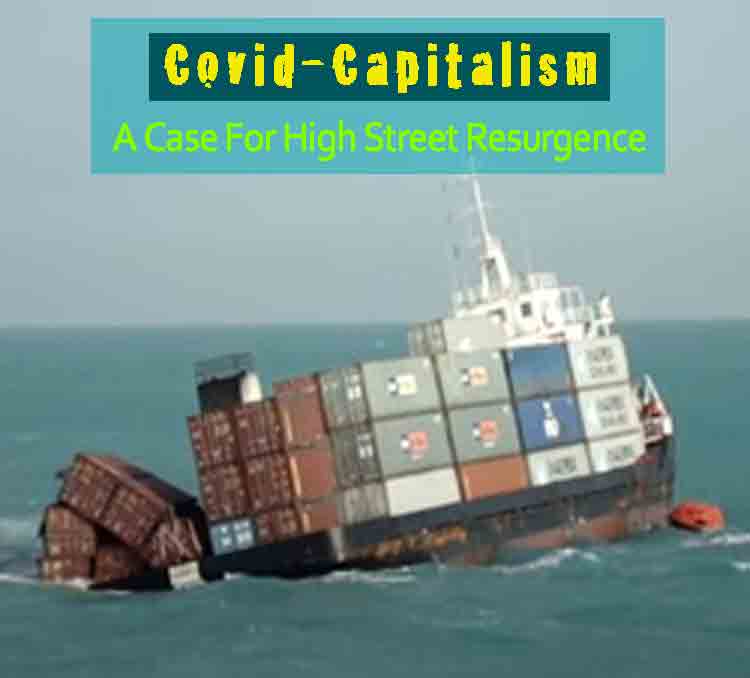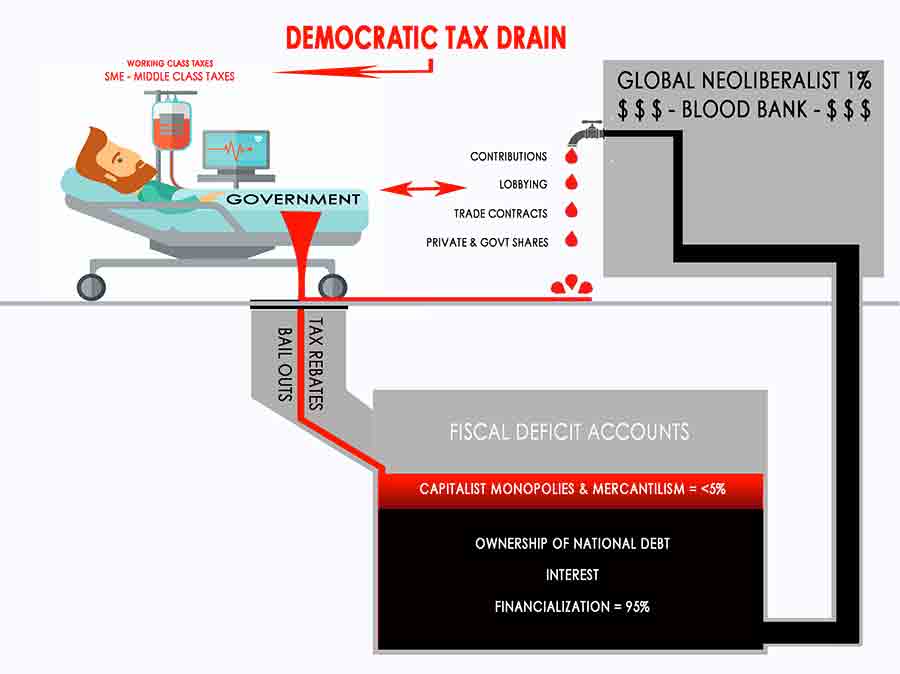
Covid-Capitalism: A Case For High Street Resurgence
Covid-19 is evidently bigger than anything. It has altered most if not all of humankind’s activities and interactions. Yet, as with the Titanic, ample prior warning of impact has not altered fiscal and neoliberal economic policy. The mentality appears to be “keep on course and we’ll carry on with whoever is left in the lifeboats.” It has not forged a collective global effort against the pandemic. Why? And how can a return to high street retail aid all communities in gaining more power to reform governments?
De-growth determination.
With deprived populations gravitating to affluent countries combined with the knock on effect of Covid-19, there is increased talk by humanitarians about re-thinking how capitalism works. But not amongst those who currently control those markets and the opportunities open to the shifting masses. Some advocate that de-growth of industry and population is necessary to save the planet. With the colossal burden upon taxation amidst plummeting incomes, disintegrating small and medium size businesses, high street retail and the most extreme fiscal policies, people wonder what the long-term backlash will be. Where will all the money come from, when it took a decade of punitive monetary policies to pay for the 2008 crash, now eclipsed by this latest recession?
So, for conservatives (a contradictory term) the struggle for a share in the global financial market, or more accurately not to become subject to the demands of whoever dominates the market, intensifies. Britain will need to seek more powerful allies than Europe to compete with the US; or end up subsumed. Either way, the fiscal choice for the UK seems mightily inhibited right now. The political will to benefit from collective bargaining power seems obstinately opposed, even to tackle the greatest catastrophe that has ever hit a truly global population.
With financialization governing 95% of the world’s wealth, the reduction of population, manufacturing, logistics, fossil fuel production and demand works in favour of the elite 1%. So why would governments jeopardise that life raft in favour of those who have little to offer and are seen as hangers on? This is why we need to reassess not only fiscal policy, but what kind of people we are responsible for putting in place to resolve our needs, and why we are powerless to do anything but sit by and watch them decimate our economic rights and lives, just as thoroughly as Assad has devastated Syria.

(Images courtesy of Wikimedia Commons)
As 40,000 UK residents are mourned within the space of nine months and government experts glibly predict another 100,000 deaths over the next six… Boris Johnson and Dominic Cummings want to prevaricate further, over any public inquiry, so their expensive legal team can divert taxes to defending their appalling lack of basic care. Whenever they wish to spend on favourable unfulfilled contracts; contracts for faulty or inadequate services and products; litigation; changing department names; reshuffles and over-staffing priorities… it is always “government money.” But “it would be inappropriate use of tax payer’s money” to urgently save more lives and hold them to account.
Johnson will go, along with Cummings, and their deceit and mass of preventable deaths will be their legacy; they are not the only conservatives directly responsible for thousands of deaths. Surely there must be an immediate legal culpability rather than excuse and side-stepping. The level of critical ignorance is demonstrable political choice by this administration, whether it is ignoring the scientific advice, or vulnerability to foreign influence. So, how do we protect ourselves against further abuses, when politicians play Russian roulette with people’s lives? If the mentality within the Labour Party is our only recourse, the prospects look bleak. Even a regression to some form of socialism may appeal to some, for respite from this blatant dereliction. That is not necessarily what is on offer with Keir Starmer, though. Is it not obvious that in all democratic governments, cronyism and the system of monetisation, including bribes, is core to restricted agendas and representation? Party Politics is way past its use-by date.
This offers little hope to High-Street retail but examining its systematic destruction and of public and political empowerment, may offer a partial solution. But it requires a progressive approach, more than simply undoing neoliberal policy and implementing de-growth or localisation. How far can we take it and can we afford not to act?
Tied Hands (and feet)
Due to neoliberal policies since Thatcher, our economic welfare has been bound to the imports and exports markets, or mercantilism. During Covid-19 the Internet has been a lifeline, but this retail development is a serious issue of opportunist exploitation of millions upon millions of people. It may well offer reduced prices (an unsubstantiated argument, long-term) for anything under the sun, but this market has not expanded choice, it has focussed and restricted it. Monopolies flood the Internet with variations on their own products appearing to be from separate retailers and suppliers, to give the appearance of choice. But when you dig into where these items originate, especially the Chinese companies, you find you have to scroll through page after page of Google or Ebay to find any alternative, as the sharks have infested search engine capabilities using big data.
Mercantilism has got way too big for its boots. This is the well established routine of monopolies and how they systematically undermine retail choice. It tethers governments to dependency on those markets, whilst hypocritically pursuing aggressive competitive and prejudicial foreign policy, including arms trades and pre-meditated decimation of foreign infrastructure. People, in other words.


Considering all the returns, refunds and protracted disputes for all parties, it raises the following questions:
- ‘What is this costing our economies?’
- ‘What is the carbon footprint of this duplicated exchange, including the waste output?’
- ‘What misleading effect does this have on records of productivity, GDP and real wealth?’
- ‘What is the social cost to morale; practical time-consumption (like distraction from productive or employers’ work time); generating public disquiet, illness and crime?’
- ‘If delivery services had abysmal practices previously, why is there no consumer choice?’
- ‘What is the real effect to these online businesses and consumer fall-off?
- What is the cost in fiscal subsidies of UK based import and export companies, food production and farming?
- ‘Will Brexit improve or compound these issues?’
Turnover
The opportunist and sometimes fraudulent practices of many on-line retailers could trigger a resurgence of high-street retail; snatching their customers from them, if they are canny enough to offer just simple basic quality of products and service. Nothing new or out of the ordinary required. Just plain and simple WYSIWYG (what you see is what you get), without waiting hours or days at home, missing appointments and losing work (paid or unpaid), to be deceived about delivery dates and times, blamed on Covid-19. Whilst retail outlets close down, Hermes courier services announce thousands of job vacancies as the only viable hope for many during this crisis.
A personal experience of this past three months’ trend must be multiplied by hundreds of other experiences and now challenges the practicality of online retail; not just imports. As a one-time postman and multi-drop delivery person, what is happening in home delivery now appals and concerns me in equal measure; considering also, every individual item is now bar-coded for specific stock selection and often tracked.

Due to their success with government backing and monopolising, products services and logistics quality has deteriorated. This is an argument for a resurgence of high street retail, even if the wholesale involves the same mercantile suppliers. Monopolies are holding back the entire world from progress, economically and technologically. There are profitable and much greener technologies available to make our lives easier and far more effective, progressive and eco-friendly; but elite mercantile companies are too successful peddling what is out-dated and inferior. So more advanced and reliable products get suppressed, if they see the light of day. Glass 3D data discs a case in point (though rich high-tech corporations probably already use them to manipulate big data).
Plugging the gap
The issue with the economy is not that there is insufficient money to go around. There is plenty of money and governments have far more than they are letting on, often fuelling financialization in offshore accounts. Even if they do not have enough, other companies have far more than enough but won’t part with it. Money can be created at any stage in any quantity if you can leverage sufficient assets against that debt. But politicians fear this as mass deficits affect national debt and the ownership of it. Neoliberals court foreign investment and trade deals, offloading long-term responsibility for short-term political goals. They will not be in office for long enough to achieve anything lasting. And the biggest hitters can always out-bat governments. They don’t worry about what happens below them. But ultimately, this process is not necessary.
The problem for government reliance on taxation is that these corporations have been made the retailers, whereas taxes are generated from small and medium businesses and High Street retail. This is the problem with mercantilism – how it benefits from financialization that governs the global economy and dependency on foreign markets; profit maximising by monopolies; government tax concessions and tax evasion. It is like transfusing blood into a terminally sick patient that is bleeding out and the public pay the prolonged hospital bill, being scapegoated as the cause of the illness.

While money is a circulatory system, neoliberalism diverts the circulatory system towards stockpiling – mostly in foreign companies – transfusing blood into a blood bank of those who do not need it, but will sell it on more expensively by withholding instead of benefitting those who need it. So, other ‘experts’ proclaim the necessity to increase the middle classes as the main source of redeemable taxation. What they conveniently omit is that financialization did this but was ultimately a false economy that caused the 2008 crash.
Sticking plaster or replacement surgery?
We’re led to believe the economy is everything. But that argument is only valid if the money circulates nationally and locally. This was the motivation for Brexit. The reason this will not happen is because politicians go googly-eyed and weak kneed at individual and party contributions from the rich. They will never pay taxes as long as they can get away with it, so why side with them? Because they control financialization and can offer incentives. They can survive whatever happens to public resources. At the same time, governments waste so much taxation resulting in health issues and social disintegration; the dissolution of everyday people’s rights has become a far broader and more disturbing practice than in any previous recorded peacetime history. So, how is control of the economy wrested from the hands of the unscrupulous that are sitting pretty and see no need of change?
If we want to make sure government facilitates access to what everyone needs and if we insist monetary taxation pays for it, redevelopment of the high street and local services is the way to go. To invest in these in the short term with created money would not be a bottomless pit. So what if it was anyway? It’s only money. It’s far cheaper and cost effective to invest in people. And people want to contribute to their own locality if the money circulates. It doesn’t require alternative circular economies, but they really do help and are a model worthy of replication (see Post-Covid: Fears, Dreams & Choices).
The idea of Universal Basic Income could be economically more efficient than government hand-outs from the diminishing taxes of those who can still afford to pay them. It empowers people to be more productive and produce more profit and eventually becomes self-financing, if it circulates through the tax system. Results from the Canadian and Finnish experiments are mixed, but again they are affected by changing fiscal and foreign policy. “Around half of the subjects reported decreased use of alcohol and tobacco, while 79 percent reported better physical well-being and 83 percent reported better mental well-being… around a third of all subjects reported reductions in visits to doctors and hospital emergency rooms. This suggests basic income may be a useful general public health strategy resulting in a reduced load [and cost] on public health services.” Rich Haridy, ‘Canada’s Cancelled Basic Income Trial Produces Positive Results’ New Atlas; March 12, 2020.
But we can do much more than wait for this revolution. We can empower it independently from government and corporations if we choose an existing non-monetary option on a scale that potentially far outstrips monetary capitalism. It is available to us now and could take just two years to establish. All it needs is for the existing relevant organisations to examine and adopt it as a mass existing market. It can then instantly reward people for any form of labour, including forming rotating public assemblies to dictate to local councils and government the use of monetary taxes, and to choose majority political representation instead of minority party-politics; all requiring no taxation of personal incomes (see: Covid-Capitalism or Corvée).
It will fuel a resurgence of unlimited access to employment and economic empowerment for all, (including monetary capitalists). It can transform this world economic crisis into uninhibited global expansion in green energy, technology and conservation. What are we waiting for? The corporations and politicians will not bring it of their own volition. They have cost thousands of lives through not cooperating on addressing the pandemic, or preserving nature, but now risk countless more in an escalating cold war of epic proportion. The high street is waiting for you to gather with others who want the same things. Some are already doing it. For a pathway that signposts not only this process and those who can bring it about, but also how it remedies the current global economic struggle please check the link below. It will turn international conflict and protectionist policies into cooperation, encouraging repatriation and restructuring without any regime change, whilst rewarding every individual of any age and circumstance as a contributor to social cohesion and continued care.
Our collective demand outweighs the current supply from monopolies and mercantilism and prospective government taxation. That’s why money is an inept out-dated mechanism. It is paltry in comparison with what every person individually has to offer our economy. Collectively we are bigger than Covid-19 and any challenge this world requires of us. This is not ideology. The practical answers already exist. Money prevents their development, but so does our fetishism of it and that of so called experts and celebrities that divert our energies to convince us it is the only answer worth fighting for. As neoliberals would have it and look where they have brought us. How much we want a different world will be determined by how much we’re prepared to look into one and do something about it, instead of waiting for people who have ulterior motives to do it for us. Instead of Johnson making compromises or more conflict with China, he could make mercantile contracts contingent upon supplying the high-street, initially endorsing and supplementing it as a partial recuperative strategy, rather than foreign businesses.
This is our immediate choice: more austerity feeding the ultra-rich, or a resurgence of local services and high-street retail. If we wished to, we could do it independently of them or tax-payer hand-outs. Using money the high-street and government are co-dependents. In the parallel non-monetary economy (PNME) the high street and general public of all persuasions and backgrounds dictate to government and corporations.
Contributed by Kendal Eaton – Author of ‘A Chance For Everyone: The Parallel Non-Monetary Economy’ (available for free or pay what you choose in download formats) – achanceforeveryone.com

The first, clear-sighted, enquiry into what is going on, I have read.
Comment by Cy Lester on 31 July, 2020 at 12:50 pmUPDATE: POSTAL HIGHWAYMEN STEALING PRODUCTS TO USE FOR EXTORTION.
following is a process that must be duplicated thousands of times.
Comment by Kendal on 29 October, 2020 at 7:23 am1 – You use WISH online retailer to order a UNIQUE item that is only sold abroad (something we are ALL going to have to get used to) costing £17.99 including postage (no option to insure against customs excise duty)
2 – you wait for months not knowing when it will arrive
3 – you receive a slip from Royal Mail stating they have the item but it requires payment of £4.50 customs duty + £8 handling fee.
4 – you pay just to get the item
5 – the day of delivery (2 days delayed now) the weather is atrocious but the delivery guy has a nice warm van, right? instead of delivering, no van turns up, no doorbell is rang – he gives the letter-delivery guy a slip saying it can be picked up at the local post-office (even if you’re self-isolating) at an EXTRA charge of £0.70 handling fee.
6 – no system allows you to contact the delivery office and even the reference number on the slip DOES NOT EXIST in the RM website re-delivery option.
7 – so you enter manual details for another re-delivery now 4 days in RM possession.
8 – you try fill out an online complaints form, which gives you NO OPTION to explain the situation in their preset scenarios.
9 – you try to fill out a clam on the site for refund of delivery costs for delayed delivery to be told ONLY THE SELLER can launch a claim.
10 – you then have to spend the time to explain all the above to the seller, asking either for refund of the extra costs paid to the original order or a full refund of those and the original item for non-delivery.